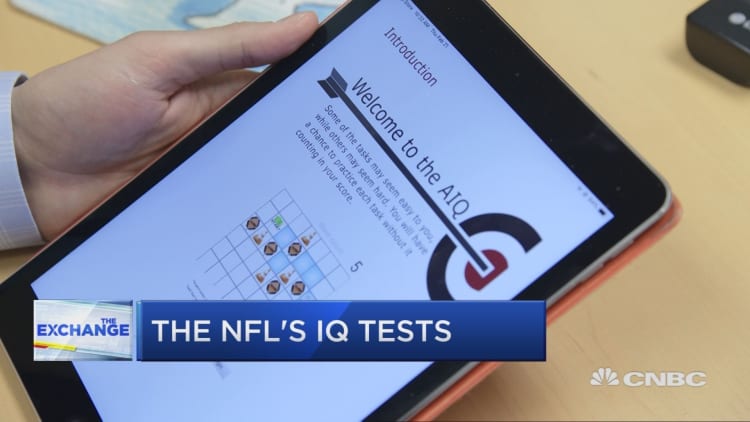
It's that time of the year, when professional football hopefuls assemble in Indianapolis for the National Football League's annual Combine, where they'll participate in a round of activities to test their physical prowess.
Yet scouts are looking at more than just strength: They're also administering intelligence assessments to test cognitive function and better understand how players think.
The two tests are the Wonderlic and Athletic Intelligence Quotient. The Wonderlic has been around since the 1930s and was introduced to the NFL in the 1970s, while AIQ has only been administered for less than a decade.
The Wonderlic may have gained its notoriety from football, but it's more commonly used by Fortune 500 companies to help assess job candidates.
Both exams have at least one thing in common: NFL coaches and scouts are relying on them now more than ever. With that in mind, I decided to take the tests myself and see how I measured up.
The Wonderlic test is 50 questions in 12 minutes, meaning you have to work quickly. There are a lot of basic math and vocabulary questions, along with logic questions and visual puzzles, like mixing and matching images. I scored a 35 out of 50 on the test. According to the company, that puts me at about the 95th percentile of people who take the test. The typical American adult averages 21.
I was honestly surprised by the score. The test seemed easy to me, and I expected to get at least a 45. But clearly, there must have been trick questions, or I guess I didn't really know what I was doing. Because the test moves so quickly, there isn't a lot of time to figure out the right answers: Test takers get less than 15 seconds per question.
"A lot of what we are measuring is processing speed, which you can tell is very important in any athletic role," said Rebecca Callahan, VP of product at Wonderlic.
"The sports side of our business with the Combine and teams is actually the smaller side of what we do," said Callahan. "Most of our work is with organizations large and small that are using cognitive ability alongside other predictive factors like personality and motivation to help find the right fit for an individual in a particular role."
Callahan said the Wonderlic is a "great data point in hiring, and it can be significantly less biased than other parts of an interview."
A major factor that the Wonderlic exam measures is the applicant's "ability to learn," said Callahan. "If you have a high degree to learn, then you will be able to memorize plays and rules, and you will benefit more from coaching and training and practice. All of those things play heavily into your performance on the field."
The AIQ
Designed by Scott Goldman and Jim Bowman after 15 years of research, the AIQ test is a much newer metric. It first appeared in the NFL in 2012 — and has since been used across all the major sports leagues, along with military and first responders.
The A in AIQ stands for "athletic," meaning the test has no vocabulary or math questions. It's made up of 10 minitests that each take two to three minutes. The entire exam takes about half an hour, and the minitests were varied. Some focused on memorizing numbers and patterns, while others were about rotating and matching images. Some were about reaction times.
"The Major League Baseball teams that use us really value the fact that they can take the test to the Latin American countries where some athletes haven't received more than a fourth-grade education, and yet they can interpret the test and perform well on it," Goldman told CNBC in an interview.
I had no idea what to expect on this test, and I thought it was extremely difficult. It was mentally taxing and stressful.
In the end, I got a 103 overall score, which is based on a scale where 100 is average among elite athletes, and 15 is one standard deviation. That means 68 percent of elite athletes will get 85 to 115.
Each of the 10 minitests earned me a specific score as well. Below is a portion of my results, showing scores for specific tests and general categories. Notice my decision-making is above average, but my reaction time is perfectly average.
The idea for these specifics is to help teams and coaches figure out how to work with each player's strengths and weaknesses.
"It's funny because the teams that have used us have been fairly successful and have even told us how helpful the AIQ was in their success to the point that some of them are Super Bowl winners," Goldman said.
In both cases, the tests are not meant to be the reason why a player gets drafted or not. It's just one of many tools to assess how certain players will fit on certain teams.
Clearly my scores are fine, but I know my athletic skills aren't good enough to be a pro athlete in anything. That's why the on-field performance will still matter more at the Combine, which began Tuesday and ends Monday.
The battery of tests are "really about understanding the athlete. No different than trying to assess how fast they run," Goldman said.
— CNBC's Jessica Golden contributed to this story.

